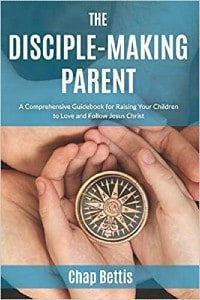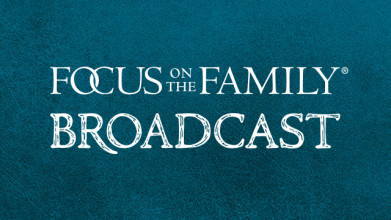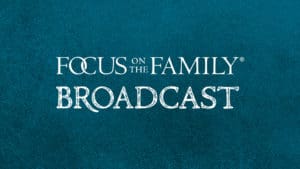Preview:
Parent #1: I think the goal for me would be for them to have good character.
Parent #2: My biggest goal, quite honestly, is for them to grow up and be good friends.
Parent #3: That they really find what they’re passionate about doing — whether that’s being a mechanic or engineer, whatever that might be. And that they would be able to just pursue that and enjoy that as a career. And really see some purpose in doing that as well.
End of Preview
John Fuller: Well, what goals do you have for your children? Uh, what we just heard sound like some good ideas. Uh, but what about the spiritual growth of your kids? What are you aiming for? This is Focus on the Family with Jim Daly, and we’re gonna examine the process of faith training or discipleship today and how you can effectively do that with your kids. Thanks for joining us. I’m John Fuller.
Jim Daly: Uh, John, we don’t often hear the word, “discipleship,” these days. Uh, but thousands of years ago, this approach of education, or to education, was quite normal. A teacher would gather a group of followers or disciples to instruct them, and the goal of a disciple was not only to learn from their teacher but to imitate, uh, their way of life, and become like them. I think, uh, Ray VanderLaan, for those that know the series, That the World May Know, this is something he really teaches that the, uh, disciples, were really asked to follow the steps of Jesus, and literally. And, uh, I had the privilege of going to the Middle East with Ray. And Jean and I both, and that was the main point. You do what the rabbi says to do, and you walk the way he walks. And it’s really emphasized in Jewish tradition. I think that’s why Jesus spent three years pouring into those 12 men, and why he calls us his disciples today. And here’s something our guests shared that I found fascinating. The word Christian only appears three times in the New Testament. Did you know that?
John: I did not.
Jim: (laughs)
John: No.
Jim: And the word disciple appears 269 times, so there’s obviously something of value we can all learn about discipleship today.
John: Yeah, and this is something that is so critical, passing on our faith to the next generation. It’s one of the biggest needs that we hear about from, uh, parents these days, Jim. Uh, they call us, they contact us here at Focus saying, “How do I do this better?”
Jim: Yeah. That’s the, that’s the big question in parenting. And we want to help you with that. Uh, that’s why we’ve invited Chap Bettis to join us. He was a pastor for 25 years before starting a ministry called The Disciple-Making Parent. Good title.
John: Mm-hmm.
Jim: (laughs) And uh, he’s an author and speaker and he has a passion to help us do this job of discipling our children better. And I want to say, welcome, Chap.
Chap Bettis: Well, thank you. It’s a plea-
Jim: It’s a little late. I’ve got 21- and 19-year old’s, but I guess I could still do this, right?
Chap: It’s never too late.
Jim: That’s it.
John: Well, Chap has written a great book that’s going to be the foundation for our conversation today. The Disciple-Making Parent. Uh, we’ve got copies of that here at the ministry. Stop by focusonthefamily.com/broadcast to get yours.
Jim: Uh, Chap, you believe many Christian parents are confused about this idea of discipling their own children. Uh, in fact you say it’s kind of a counter cultural thing. Why is it counter cultural?
Chap: Well, I think every parent wants to give their kids the best.
Jim: Yeah.
Chap: The question is, what is-
Jim: Hm.
Chap: The best.
Jim: Okay. What is it?
Chap: Well, we’re surrounded by people who say the best is sports, the best is, ex-, uh, education, the best is, uh, a number of experiences. I want to give my kids lots of experience.
Jim: Mm-hmm.
Chap: But what I, what I want to do is as from the perspective of 10,000 years what is best? And the answer to that, if we’re Christians, is the gospel. And really, I think sometimes in one side of our brain we have our parenting philosophy, and then we have what we know about the Bible on the other side. And I want to bring those together and say God hasn’t just given you a baby. He’s given you an eternal soul to, uh, to influence.
Jim: Uh, is it a matter of degrees, though? I mean, I think it’s reasonable for a parent to say, “I hope my son or daughter grows up to do fill in the blank.” I mean, and, and if you see that interest as a eight, nine, 10-year-old, you’re going to … It’s probably one of the reasons kids are in so many sports programs, right, because I had the next NFL quarterback.
Chap: (laughs).
Jim: Right in my own family or whatever it might be. But, maybe it’s uh, a question of emphasis. And so you want to develop them vocationally with their interests, but at the same time, the more important thing that you’re saying is make sure that they’re developing spiritually.
Chap: Right. I, uh, absolutely. Those are all things that I think we’re called to develop our children. Um, and I, certainly I got a great education, tried to give my own kids a great education, involved them in lots of activities. But, 3 John 4, Johns says, “I have no greater joy than to hear that my children are walking in the truth.” And so, to me, it’s what is the first priority? What is the north star that I’m aiming at? And all these other things we’ll add in, and we’ll have a good time, but what is that what is that north star?
Jim: Well, hopefully we’ll unfold that over the next half hour. So, uh, let’s, let’s kind of progress through this, though. You address the problem of child centered families. I think I understand where you’re going. Uh, this would be where parents do almost anything for the sake of their kids. I think the chauffer mom or dad-
Chap: Mm-hmm.
Jim: Is probably, uh, you know, an example of that. But you told your children, “I’ll die for you, but I won’t live for you.” What did that mean?
Chap: Well, I, you know. E- every parent will, a good parent will, will sacrifice for their children. But having said that, I think as we develop them in all these activities, they can get the feeling that they are the center of our universe.
Jim: Hm.
Chap: And that’s a very heavy weight for a child. Like, they, they’re not called to be the center of the universe. Jesus Christ is the center of the universe. And therefore, he’s the one first I live for. And of course my kids are welcome members of the family and, and yes, we make huge sacrifices but, uh, I want them to know that I, I’m living for something bigger than them, that my, my joy is, is not totally tied up with them. First, I serve the Lord, then I love my wife. Uh, I’m also involved in a church, and yes, along the way, we do some sports things, and we do some educational things.
Jim: But again, uh, so often in parenting, I mean it’s kind of like a dimmer switch. You know, it’s not on or off. Your kind of living in this, you know, this degree of-
Chap: Yeah.
Jim: Life. So what are some of the practical things that should alert you that you’re creating a child-centered family? I mean, taking them to school is a good thing. (laughs)
Chap: Yeah.
Jim: So that doesn’t fall in that box, but give us some examples of what, if you were to do a self-assessment, you might go, mm, okay, I might be creating a child centered home?
Chap: Well, let’s go back to uh, did you really have a son who you thought was going to be a NFL quarterback?
Jim: I had two of those.
John: (laughs)
Chap: Okay, so-
John: (laughs) It wasn’t a hypothetical for him, Chap.
Jim: (laughs)
Chap: Okay. Okay. Well, there’s only-
Jim: But they didn’t go that direction.
Chap: There’s only 70 NFL quarterbacks, and so is that, even as I try and develop them, I need to ask, “What is the sake of eternity?” So in other words, for me, I guess, in that situation, I’m thinking is this helping them grow and flourish and become a man of God, or at some point, have we moved from Jesus being the idol, the center, to, to sports?
Jim: Yeah.
Chap: So I think counter cultural things like being committed to a local church, to evaluate those sports, uh, events in light of is this developing them as a person? Uh, every coach is going to ask you for more time, more money, right? But, uh-
Jim: No, it’s so true, and I think for the sports dad, that’s one thing you got to reel in really quickly and not, you know, kind of load the pressure onto your son or daughter that they need to play something.
Chap: Right.
Jim: It’s a, it’s a good experience, but if they don’t have the interest, they’re not doing the wind sprints.
John: Right.
Chap: Right.
Jim: Uh, describe a time, and I think we share this in common, too, probably many moms and dads, uh, I think it leans toward dads having this experience when you first hold that firstborn, and lots of emotion run through your mind at that time. I’m not going to be a good enough father, uh, to, you know, I don’t want to break this little fragile thing, and all those thoughts. What was your experience like?
Chap: I’m getting teared up even as I think about it now. I can remember May 24th, 1991, like it was yesterday, you know. And, uh, I, y-, you know, I think for dads, it’s just this theoretical concept. We’re going to have a baby. And then this person shows up and you’re like she’s so helpless, she’s so dependent on us. But I think what struck me as, as I drove home from the hospital, uh, and I just re-, I remember breaking down in tears, was combining, again, combining my experience of seeing my daughter for the very first time with what I know about the Bible and saying, “God has not just entrusted a little girl to me.” This is a soul-
Jim: Mm-hmm.
Chap: That’s going to live forever. And I have the ability privilege, my wife and I have the privilege of influencing her towards the Lord Jesus. And, and so I remember crying out on the way home just in tears saying, “Lord show us, show us how to do this.”
Jim: In, in Matthew, the great commission, you’ve kind of suggested, you, strongly in the book, that, that starts with your parenting. I don’t think a lot of people will apply that scripture to your parenting, uh, assignment, but I see the analogy. Explain it further.
Chap: Well, Jes- … In Matthew 28, Jesus gives us what’s been called the great commission, which we’re to make disciples of all nations, and churches rightly send people across the oceans and go across the street, uh, so that, that there will be followers of Jesus. But I’m suggesting we also need to go across the dining room table, because, um, when you disciple someone in the church, you get them for maybe a year, maybe a, maybe two years, but God gives you these little people that you get to influence, and they start imitating you and, and you get to teach them, and, and shape them, uh, for good or for bad, and uh, you know, it’s quite a privilege. But yeah, I would suggest that Matthew 28 uh, the make disciples actually applies to us as parents.
Jim: No, I think it’s good and a good way to look at that. Uh, as parents, we want our kids to be a good reflection of uh, of our values. I think we tend to lean toward behavioral measures. You know, our kids are telling the truth, they’re making their beds, they’re doing everything (laughs) right. They’re getting a sticker for the right things. Uh, I understand you had an experience with your daughter when she was pretty young, and, and uh, I think she kind of, um, misinterpreted some things. So what was that story?
Chap: Well, y-, y-, you know, you think example’s a very powerful teacher, right? So you’re, you’re just, so, my four-year-old daughter and we’re taking her to church and we’re singing hymns and we’re reading her the Bible and, and, uh, so one day, I, she’s upstairs in her room, and I hear her singing Holy, Holy, Holy, the great hymn.
Jim: (laughs)
Chap: And I’m like-
Jim: I’m such a good father.
Chap: That’s exactly-
Jim: (laughs)
John: (laughs)
Chap: You know you’re just like, “Oh Lord,” you know, I’m like what’s the problem with these other parents? You know, you’re just-
Jim: We’re doing it right, honey.
Chap: All the-, all these proud thoughts that come into your head, but uh, so I want, you know, I want to sneak up to get a closer view, and uh, sure enough, she’s in her bedroom. She’s got her mother’s, uh, high heels on. She’s pretending to be on stage, you know. But when I get up there and peer around the corner, in her hands she has fistfuls of play money, and she’s not singing Holy, Holy, Holy. She’s singing money, money, money.
John: Oh my goodness.
Chap: (laughs)
John: (laughs)
Chap: So here’s, you know, full throated, uh, worship of money in my little four-year-old, which of course is hilarious in a four-year-old.
Jim: Right. She didn’t understand the concepts.
Chap: No, no, no. But it was hilarious.
Jim: And how is she doing today?
Chap: She loves-
Jim: Is she shopping a lot? (laughs)
Chap: She loves the Lord; she still loves to sing.
Jim: That’s good.
Chap: Uh, but, and she loves the Lord.
Jim: No, that’s excellent. Uh, God has put us into families so that we can learn, you know, important lessons about conflict, forgiveness, uh, and getting along with each other. I mean, I think that’s one of the great benefits of family and the structure of family. That’s where you learn who you are and how to relate to others. Uh, you’ve paraphrased a familiar Bible verse. I think it’s John 13 in terms of parenting. So explain why that verse, uh, means something to you in your parenting journey?
Chap: Well Jesus in John, uh, 13 on his final night, he says, “All men will know you’re my disciples if you love one another.” So there, certainly there’s a case and in my own testimony, case for apologetics, but the ultimate apologetic is a loving church. Brothers and sisters loving each other. And so in a similar way, you know, the church, or sorry, the family, is a uh, is a small unit in God’s family, and so to see family members loving each other, now that means overcoming conflict. It doesn’t mean conflict free.
Jim: Mm-hmm.
Chap: But loving each other, having joy, reflecting the trinity. That’s attractive. That’s attractive to our young people who see other families that are broken. And it’s attractive to the world.
Jim: Yeah. You know the one difficulty I think, um, when you’re looking at that, that parenting issue, you know, start there and reflect the character of God, it’s hard for human beings to be perfect. Have you noticed?
Chap: (laughs)
John: (laughs)
Chap: Only today.
Jim: I mean nobody sees that clearer than your spouse and your children.
John: Yeah.
Jim: Because they’re living with you all the time. You know, when you drop the can on your toe and you don’t usually go, “Wow, that was an amazing experience, I wonder why God put me through that.” It’s not usually our response, but in that context, how do we avoid hypocrisy? You know, so our kids can truly see the spirit of God in our lives consistently. Maybe not 100%. And then how do we talk to our children about that when we blow it?
Chap: Well, I think, I think it’s understanding that the first place and the hardest place, but the first place I live out the gospel is in my home. So the way I treat my spouse, the way I treat my children is really the real me. And so to hold myself to a high standard, to say that that uh, that I actually need to love them no matter what happens. And then of course inevitably, we fail, and to be able to confess it to the Lord, to apologize to our, to our kids as well.
Jim: Yeah. You use the term Pharisee parenting, which I appreciate. I mean, that’s you know-
John: Hm.
Jim: Knowing the law, knowing the rules, but not having the heart for someone. I think a lot of children growing up in Christian homes can identify with that. They, they never can be perfect, so they always feel like they’re failing at something. They may do, be doing well in other things but if they’re not pleasing their parents with certain behavior, bam, they can get the hammer. And so how do you manage that as a parent not to be the Pharisee parent?
Chap: Well I think to me hypocrisy is not saying one thing and doing another. It’s saying one thing and doing another and not caring. So as a Pharisee parent I want to be growing myself and then I want to, as, or as fighting to be a, not a Pharisee parent, I want to be growing myself. I want to be able to see my own sin, and then I want to put, be able to put my arm around them uh, literally, or figuratively and say, “We’re going to defeat this behavior together.”
John: Hm.
Chap: So it’s not like you’re a sinner and I’m not. It’s we are, we are both, I am called to a position of authority, but I’m going to put my arm around you, literally, or figuratively, and say, “Let’s let’s defeat this together.”
John: Mm, okay, so Chap, I’m thinking of parents who, like myself, might have experienced kind of an epiphany of oh, I am actually a Pharisee parent. I think, I think the Lord gave us six children because I needed a lot of sanctification.
Jim: (laughs)
Chap: (laughs)
John: So, I can’t remember which child, but I suddenly realized as I was calling them to this super high standard, that when I was their age, I was just like them. And it really caught me by surprise because I thought, well, I was, I was projecting perfection. Okay? I was holding them to a higher standard than I could possibly attain. So, um, talk to the parent who is feeling like okay, uh, they’re touching on something. What do I do? Is it too late?
Chap: I don’t, I don’t think it’s too late, I, uh, you know, I think the parenting paradox is we expect them to obey because God commands it. We expect them to disobey because they’re children. And so in a similar way, how do I, how do I strive and encourage my child to be his best, and I certainly did that with my children. Uh, my wife as well, and yet also say we’re all going to fail and home is the place where you can come and you can talk about how you feel like you, you failed. And, and we’re on your side-
John: Yeah.
Chap: No matter what.
John: There’s a lot of asking for forgiveness, and I’m still doing that as, uh, as they’re adults now. So, we’re talking today to Chap Bettis, on Focus on the Family. Your host is Jim Daly. Get a copy of Chap’s book from us at focusonthefamily.com/broadcast, or call 800, the letter A, and the word FAMILY.
Jim: Uh, Chap, in the book you mention three common myths, uh, moms and dads have about discipling their children. What are they?
Chap: Well the first is uh, that the prefect environment will guarantee the perfect result. And that’s, uh, y-, y-, you know, we’re raising kids. We’re not, this is not a cookbook, uh, but going back to you know your comment, just ha- just trying to have the perfect environment. Uh, and that’s simply not true. Kids come with, uh, with sin on their hard drive.
Jim: Yeah.
John: (laughs)
Jim: But how do we as parents, I mean we do believe in formulas, unfortunately. A plus B equals C. But, with human beings, and I’m sure the Lord when he created Adam and Eve, had an idea of the way things would go, although he had all knowledge, so that’s a little bit more of a benefit, but you know, they rebelled.
Chap: Yeah.
Jim: Against God. And kids are going to do that, too, even if you’re the most loving parent they could have. You can’t control them and that’s the difficulty.
Chap: I think parents of prodigals need to hear that.
Jim: Yeah.
Chap: Because, because children, God gives all of us the ability to choose. And I think what kind of surprises us is when they’re young, we are able to control them. But later, as teens, as adults, we cannot nor should not.
Jim: Yeah.
Chap: And so they’re, they’re making their own choices and it’s, it’s not, I would say we’re not called to be successful, per se, but to be faithful.
Jim: And I like the word predictive, because that’s what it is. If you do these things and your children learn these things, it’s predictive that they’ll do well, spiritually and in every other way in life. What are the other two myths?
Chap: Well, the other two is that the ultimate goal is to have my, uh, have my kids follow the Lord. And we talked about that a little bit already, but my first priority is my own walk with the Lord. And then my spouse, and then, and then also perhaps serving in the church. So, children are welcome members, but, but they, they can’t control my joy. My joy is in the Lord, uh, even though, there’s going to be ups and downs, of course. And then, the third myth is that it’s all up to me. And then that’s not, that’s not true.
Jim: We, we, I don’t believe we would say that as a parent. I, I don’t think that would be, maybe so bold, but we do it.
Chap: (laughs)
Jim: And we may not think it.
John: Yeah. We act it.
Jim: But we act like that, like it’s all up to us.
Chap: Well, and sometimes it’s, it’s pride. I don’t want to share with other people in the church what’s going on, or I don’t want to say, “What, what did you do in this situation? We’re struggling with this right now.” Um, yeah.
Jim: I think one of the things, too, is our eagerness as parents to get our kids to the altar to make a profession of faith and, you know, do everything correctly, their baptism, et cetera. But you really, as a parent, you have to, you know, let your kids emerge in that understanding of their faith.
Chap: Mm-hmm.
Jim: Explain why you believe discipleship is that ongoing process with our children, especially during their teen years when they’ve got so many cultural influences pulling at them as well.
Chap: Well I, I think there’s a battle for our kids, but I think this is so important. And this is what I don’t think is understood. We find it in scripture. Paul said to Timothy, “As for you timothy, continue in what you have learned and become convinced of.” So Timothy grew up in a home where unbelieving dad, so hope there for every single mom. But a mother and a grandmother whose, the faith lived in them. But he, he seemed to have learned the faith and become convinced. That fits my own story, and then when I’ll teach in seminars, I’ll ask, I’ll say, “If you grew up in a gospel preaching home, church, raise your hand and then let me ask you this. How many of you, keep it raised, if you would say there was another time your faith became your own?”
Jim: Mm-hmm.
Chap: And 98% of the hands stay up.
Jim: So in that regard as a parent, what you’re really doing is creating the, the right soil, right? Letting that child’s heart become, um, obedient to the word of God. And that’s, that’s an art of parenting so that they don’t become, uh, against it. They’re not set against it through your parenting, but that they’re hearts are open to what God claims. I think with my boys I’ve recognized that. I mean for me the goal was do they have the basics; do they understand those things, and can they embrace them? And then God’s got to do the rest. And I’ve had those discussions with the boys. They’re not always going to make the right decisions, like you said, John. They’re not 50-year-old, well let’s say 60-year-old-
John: (laughs)
Jim: Christians. They’re, you know, they’re 19 and 21. And they’re going to make decisions of a 19- and 21-year-old. You’ve got to be able to do that. But, um, you know, that’s part of it is making sure they understand what the Lord’s heart would be for them in that situation, that environment.
Chap: And continue in the conversation as well-
Jim: Yeah.
Chap: Realizing, yeah, that they’re still-
Jim: Absolutely.
Chap: Still wrestling with their faith.
Jim: It’s really important. Uh, you have talked in the book about this idea of mind reading your children. I love that. I think, I think I am guilty of that, you know. Let me tell you what you’re thinking.
Chap: (laughs)
Jim: How does it work?
Chap: Well, you know, part of how do we connect to the heart, we connect to the heart through communication. And we’re actually doing realize how poor communicators we are sometimes. So some of us over talk. Some of us under talk. And yeah, so my kids called me out, uh, for reading their minds, which is not giving them time to respond to a question but telling them I knew exactly what they were thinking. (laughs) And that, that was helpful, you know, to say, “You’re right. You’re right. I’m not communicating well.”
Jim: Yeah. I think uh, Chap, when you get down to it, the parent that’s hearing us describe this maybe isn’t feeling like they’ve done what they need to do with their 12, 14, 17-year-old. And I want to give them something to change tonight when they’re with that person, that young person in their home, their child. What can they do to kind of re-, restart the relationship is probably the way to do it? If you’re feeling that much guilt. If the Holy Spirit is really penetrating your heart right now and you’re going oh, man, I’ve blown this. I’ve set all those expectations. I have measured behavior. I haven’t done enough-
Chap: Mm-hmm.
Jim: To invest in the heart. Um, I’m critical. And we can all be that way at times. What can they do differently?
Chap: Well, I, I, you know, the glory of children is their parents. They love us, and they are very forgiving. If we just, and if we, you know, confess to them, con-, confess to the Lord and really change, not just manipulatively confess it, but, uh, if we really change, there is connection. So my own, uh, wife’s huge impact on her when, when her father changed from a high corporate job to start his own business for the sake of the gospel. So, uh, they’re very forgiving. So, if, if we will, if we can confess that to them and change.
Jim: In fact in the book you, you mention a parable or a story where uh, you talk about caring a jar of acid. It’s probably a good place to land because it’s a powerful story of what to do and what not to do.
Chap: Well it goes back to the, the idea that the, the first place I live out the gospel is in my home. And the kids shine a floodlight on my soul, so I want to change no matter what. And the sto-, the analogy which is not original from me. I think I got it from the late Dr. David Polson, uh, is the, imagine carrying a cup of acid through a crowded room. Someone bumps into you, and you spill acid on the person. And, and, the person says, “Why’d you spill that?” And what do I say? “Well, because I got bumped.” That’s why I spilled the acid.
Jim: It was the other person’s fault.
Chap: Y-, Yeah. It’s the other person’s fault. But the truth is the reason I spilled acid is because there’s acid in the cup. And if there’d been no acid in the cup when I got bumped, then no acid would have come out. And so, you know, Jesus said, “Out of the overflow of the heart the mouth speaks.” When Jesus was reviled, when he was bumped, he did not revile in return. And so I’m responsible for my actions and my reactions and I can grow. Uh, in forbearance-
Jim: Yeah.
Chap: With, with others. And so if I, if I see that, that’s what God’s trying to do. A lot of things, but one of the things is he’s trying to very practically make me more mature.
Jim: Yeah, and Chap, that’s exactly why we wanted to have you on and talk about your book, The Disciple-Making Parent, because what I hear you say in that last comment, always be willing to grow. Especially as a parent, um, because it’ll make you a better person and diminish the amount of acid in your cup, hopefully to the point where there isn’t any. That’s the goal of every Christian, right? To, uh, model what Jesus has done for us. And so if you’re in that spot, if you’re that parent that you feel like wow, I may have too much acid in my cup, get ahold of us today and, uh, make a gift of any amount. If you can become a monthly sponsor that’s wonderful. A onetime gift is terrific as well, and it’ll be our way of saying thank you for being part of the ministry. We’ll send the book along to you as that thank you.
John: Get in touch today, donate as you can and know that we’re here for you. We have lots of great resources, including this book, The Disciple-Making Parent. Our number’s 800, the letter A, and the word FAMILY, or stop by focusonthefamily.com/broadcast.
Jim: Chap, again, it’s been great to have you. Thanks for being with us.
Chap: My pleasure. It’s a joy.
John: And once again, if there’s anything we can do to help you along the journey, uh, just give us a call, 800-232-6459. And let me invite you and your family to visit our headquarters here in Colorado Springs. You can see a broadcast in action maybe and visit our Adventures in Odyssey play area with your kids. There’s always a lot of great outdoor activities here in Colorado as well. And in the meantime, we hope you have a great weekend with your family and friends and with your church family as well. And be sure to join us on Monday for an important conversation with Virginia’s lieutenant governor Winsome Sears.
Preview:
Lt. Gov. Winsome Sears: There’s sometimes I’m getting ready to deliver a speech, and I’m starting to get nervous, and you know what, Lord, you sent me, and I just have to speak to you. And as long as I speak the truth, then I’ll be all right.
End of Preview





















